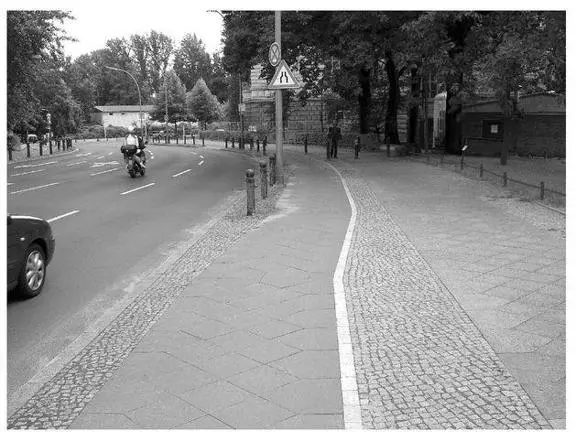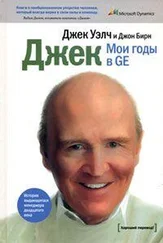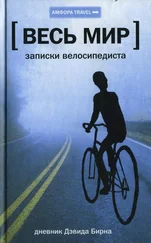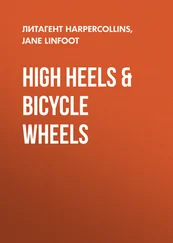
Here even the bikes themselves are practical. They are usually black, with only a few gears, mudguards, and often a basket—something no sport cyclist would ever even dream of adding to a mountain bike in North America. In Holland they go even further, with special carts for kids and groceries and bike windshields (!) for your child. Granted, riding in the streets of New York City, with the recurring potholes, bumps, and yearly resur- facings, is closer to an extreme sport than riding is here, where somehow, despite the harsh winters, the streets are mostly smooth and obstacle free. Hmmm. The biggest bumps here are on the occasional cobblestone streets or bits of pavement. How do they do it? Or rather, how is it that the richest country in the world doesn’t seem to be able to do it?
In making smooth streets some may say that the Germans have ironed out the psychological bumps in their daily lives. If the New York City streets are wilder and funkier (at least outside of “Mall Manhattan”), then these German streets are on Prozac—civilized but slightly less exciting. But should we in the United States be forced to ride on “exciting” streets?
Modern northern European society is fairly homogenized. There are immigrants, but they still don’t make up a huge percentage of the population. There are also fewer economic differences and gulfs between the classes here than there are in the United States, except among those same immigrants—the Turkish in Germany, Indonesians in Holland, Africans in Belgium, and North Africans and Arabs in France. For the white folks, the locals, it is certainly a more egalitarian life than in the U.S.A., at least as far as social services are concerned. These same white folks are now aware that people from their former colonies now wonder why they also can’t get the free medical care and schools. Even if people can vote in a country, as they certainly can in most of the United States, if there are incredibly wide economic differences and inequalities in education and health care, then the majority’s interests and the public good cannot prevail. A minority’s will is trumping that of the majority. Then true equal representation doesn’t exist.
I’ve been in Germany many times over the years. At first, in the late ’70s, Berlin seemed exotic and exciting, a cold war icon. I remember traveling the well-guarded corridor leading to Berlin from Hamburg—a kind of gauntlet through part of East Germany, it seemed to us then—and past Checkpoint Charlie, the U.S.-controlled gate in the Berlin Wall, with its associated tales and propaganda exhibits of desperate and failed escapes from the East. There was at the same time the degeneracy evidenced in the various punk clubs and discos in West Berlin. You always remembered that you were confined here, a prisoner on an island of luxury, culture, and pleasure—plopped inside the drab, serious, high-minded East. The city as a tease, a temptation. I imagine that made living there a little more exciting and a little crazier as well.
For the walled city with no room to expand that it was in the ’60s, ’70s, and ’80s Berlin had a surprising number of parks and greenways. Being almost flat, it was, and still is, a perfect place for getting around on a bike, though the winters can be bitterly cold with the winds sweeping down from the north. It has a great film festival, which often features movies from the East and from countries not known in the West for their cinema. I once saw a wonderful Turkish film in which a respected theater director takes a quick job acting in a shampoo commercial, only to find himself stuck living in the imaginary world of the characters in the advertisement. His new family knows him only as the character in the ad, and they know what he does for a living, etc., but he, the actor, has no idea. After some initial befuddle ment, he gives in and attempts to adjust to his new life.
Prisoner Number Seven
When Rudolf Hess died—the last Nazi prisoner held in Spandau Prison—reportedly by strangling himself with an electrical cord, the whole building in that western suburb of the city was said to have been dismantled, brick by brick. The bricks were carted off in the night by the British, whose sector the prison was in, and then ground into powder and thrown into the sea—as if the prison, or even its bricks, might have attracted neo-Nazi sympathizers if left intact. Did they think the sympathizers believed some of Hess’s energy might have rubbed off on the bricks? Anyway, one day it was there and the next day it was gone; all that remained was a sandlot.
For twenty years he was the only prisoner in the whole complex, “the loneliest man in the world” according to one book. What a beautiful image. Apparently he could wander more or less at will around the vast prison, but no one was allowed to touch him or to shake his hand. (Again, like the bricks, it seems it was assumed he possessed some magical Nazi touch juju.) He had famously flown to Scotland in 1941 in hopes of negotiating a peace deal. He parachuted onto a laird’s property south of Glasgow and was allegedly arrested by a man wielding a pitchfork.
Trade-off
I arrive in town from the airport. The taxi is slowly prowling around in the early morning looking for my destination, and it is gray and no one is about. But there, on the other side of the street, a man is walking in a bright red outfit; he is a round German dressed as an American Indian chief, feathers in his headdress, winter moccasins and all. He is all alone—the street is deserted. At first I think to myself, Oh, the nutters here are really inventive! but then I realize it’s Carnival week and he’s probably stumbling home after a long night. There is a whole Wild West phenomenon here sparked by the novelist Karl May. His series of popular Western novels features the Indians as the heroes.
The German national colors, not the colors of the flag but the colors one sees most often, are yellow, mostly of a dull sulfur hue; green, leaning toward a dull forest tone; and brown, ranging from a muddy beige to a rich brown earth tone. These warm earth colors and their combinations are the most popular ones for buildings, clothes, and accessories. To me they signify Germanness—the national and cultural identity. This is national stereotyping for sure, but it makes me wonder: does every culture have its palette? Certainly buildings used to be made of local materials and as a result London’s buildings are often redbrick while those in Dallas are beige.
In the hotel elevator there are glass walls that allow a view of the highway just outside the hotel, and simultaneously on the opposite side, a view of the elevator shaft and its workings. The cables and mechanical devices are all immaculate—spotless, almost dust free. In New York these shafts would be filthy, every surface caked with dirt and decades worth of old grease, and the floor at the bottom of the shaft would be littered with discarded coffee cups and rat pellets. When I mentioned this to a North American friend he responded, “Yes, but we Americans have better music.”
Whoa! You may not care for techno, a musical mainstay of a lot of the discos here, but a lot of people would claim that Ludwig van, Bach, and Wagner alone could hold their own against whatever North American crap you care to name. So yes, that statement is ridiculous, but what does it mean? What was implied? Besides being unprovable, is there an underlying assumption that cultural and social qualities are finite? That a surplus of one necessarily means a deficit of another? That cleanliness and order will necessarily sap some other qualities? (This has a corollary that if someone is beautiful he must be stupid.) That whole nations and people have psychic things in common that only take effect when you cross passport control? Is this idea like the one expressed in Will Self’s wacky short story “The Quantity Theory of Insanity,” where there is only so much sanity to go around? The implication is that every psychological thing, every part of our mental makeup and character is a trade-off against some other, unexpressed, form of social behavior. If you’re hap pier than average, you have, in this view, forfeited something else—intelligence, for example.
Читать дальше










